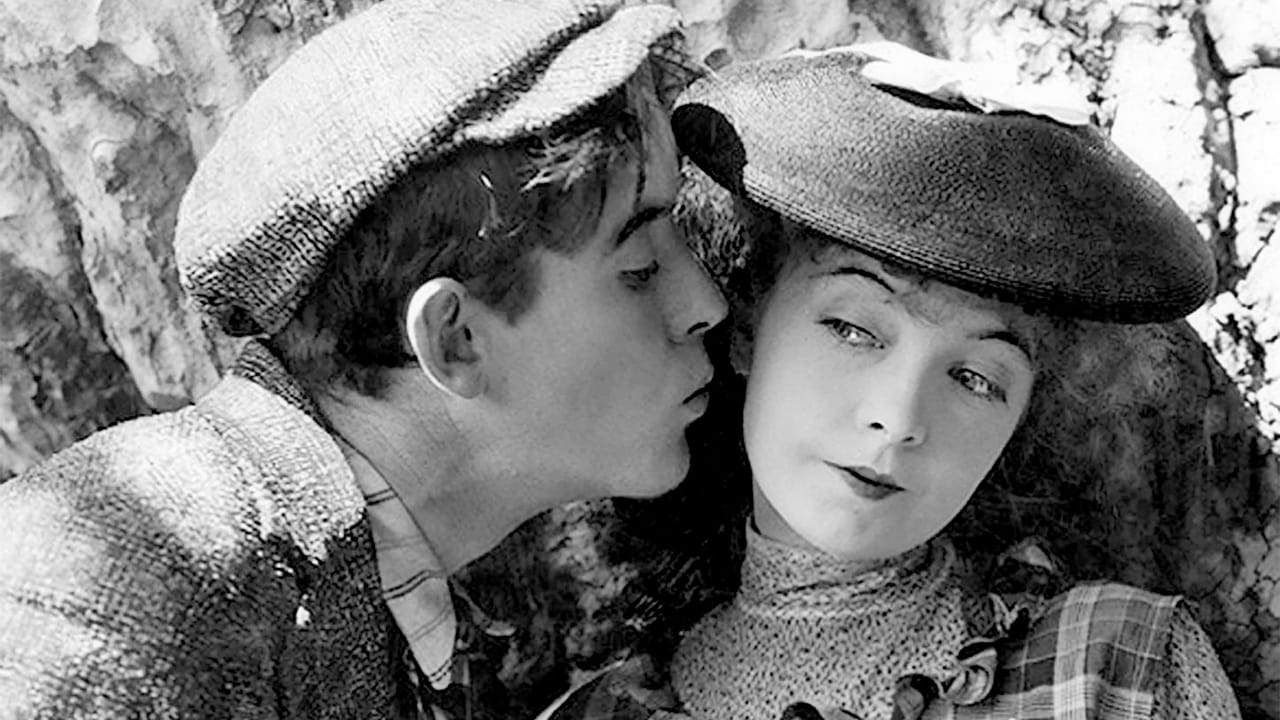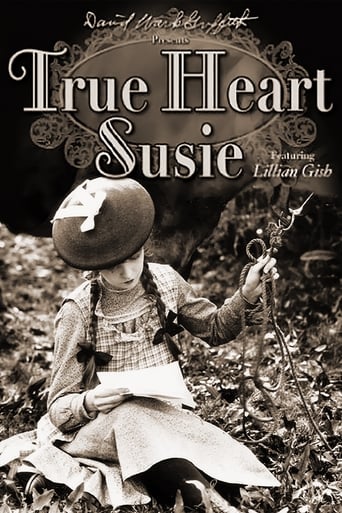StunnaKrypto
Self-important, over-dramatic, uninspired.
Doomtomylo
a film so unique, intoxicating and bizarre that it not only demands another viewing, but is also forgivable as a satirical comedy where the jokes eventually take the back seat.
Keeley Coleman
The thing I enjoyed most about the film is the fact that it doesn't shy away from being a super-sized-cliche;
Celia
A great movie, one of the best of this year. There was a bit of confusion at one point in the plot, but nothing serious.
jrmontalvo3
D.W. Griffith was a Silent films era genius, this man created masterpieces. In this film, it is a love story between a little boy and little girl, who grow up together, this love story has a little of a spin to it. Most love stories it takes a little for them to both realize they love each other and for them to end up together. Well in True Heart Susie, Susie is in love with William who has no clue that she has those feelings for him, although she makes it as obvious as possible for him to actually understand her feelings he still does not understand. Well William tries going to college, but doesn't have the funding to be able to get into college, Susie finds out this information and sales her beloved cow that was passed to her from her mother as she died, this cow had great meaning to Susie but she sold it to get money for William to be able to go to college. William gets into college and moves away, when he returns from college he has finally been educated, but when William returns from his college life he comes back with a new women he is married to named Betty Hopkins who is only marrying him for his money and has affairs with him behind his back. Susie catches Betty, but loves William so much she can't tell him and therefore keeps her mouth shut, until one night Betty lies to William and leaves the house to go party. She didn't realize she lost her house key and was locked out in the rain and nasty weather for hours until she went to Susie's later on she would catch pneumonia. After Betty passes away Susie's aunt finally explains everything to William who then marries Susie. The way this movie catches you isn't only through the love story drams, but how you can follow Susie's emotions like you can almost feel what she is feeling, that is what makes True Heart Susie Significant silent film.
ErinKan214
D.W Griffith is considered the first director to implement narrative techniques to his filmmaking and "True Heart Susie" is a great example of this. While I wasn't immediately impressed, I found that as the movie progressed I connected with the characters more and more. Susie is a plain girl with completely honorable intentions who falls in love with William. Lillian Gish does remarkable job acting "for film." Her facial expressions are not too over- produced but it is easy to read her thoughts from a simple arch of her eyebrow. Griffith is definitely making a social statement on old-fashioned values. Susie is a pure character and the film really remains honest throughout. For a silent film, it really kept my attention. The thing I really loved was the character Clarine Seymour played because I think her acting; along with Lilian Gish's was a real testament to the time. Seymour's character is not meant to be hated and she does a lovely job pulling off the "vampy" personality without losing the viewer completely. Also, since I was watching this for a film history class, it was a nice departure to see more subtle acting. This is not similar to "Birth of a Nation" at all so if you are looking for a more epic film by Griffith, this is not it. "True Heart Susie" is an intimate, honest journey of a young girl whose values are tested in serious ways. No matter what statement D.W Griffith was trying to make with this film, he made it enjoyable to watch.
K Bunck
The second that William married Bettina I knew she'd have to die. I'm not being melodramatic just truthful this movie was made and takes place in the early 20th century; no one got divorced back then, the only way that marriage was going to break up was for either William or Bettina to die. I only hoped for Susie's sake that it would be Bettina. Although, with the careless fashion that William treated her love and sacrifices it might have been better for Susie, if William was the one to die. Susie believed that her happiness was directly related to William, this displays the mindset of the time that women need men to be happy, and is proved as the movies "happy ending" has Susie marrying William, and though it is no longer the mindset of the American public that a women needs a man to be happy, it is still a myth perpetrated by Hollywood as most films still contain this classic "happy ending". If William had died and was out of the picture Susie might have been able to live her life for herself, instead of for William. Throughout the movie every action Susie makes is directly related to William. Whether she's selling her cow to send him to school, or protecting his wife, all her choices are made with William in mind. We never see what Susie wants, besides of course, her desire to marry Williams, which might just have stemmed from a childhood crush; that would have passed if she had not made it her life goal to make sure William got everything he wanted. We learn very little about Bettina except that she's selfish and thinks only of herself, a direct opposite to Susie, who cares only for William and her Aunt. This comparison between Bettina and Susie is alluded to several times throughout the movie, each time with Susie coming out on top. I believe the director did this to keep us from bonding with Bettina, so we would not care when she died and resent Susie her happiness. All in all not a bad movie, pay special attention to the title cards they're hilarious.
MartinHafer
It's rare that the ending of a film can undo so much of the rest of the movie, but "True Heart Susie" by D.W. Griffith is one of those films. It's really a shame, as the movie had been quite good up until that point and had a lot to recommend it.The film begins with Lillian Gish wanting to help her sweetheart (Robert Harron) get the money for college. When a rich guy meets Harron and promises to one day help him (but doesn't), Gish decides she'll be his benefactor--secretly giving him money he assumes is from this rich man. Using the money Gish obtained by selling her farm animals, Harron is able to work on campus and earn enough to get his education. When he returns, he's now an ordained minister and appears ready to settle down in his home town. However, he still doesn't know that Gish helped him. She assumes they'll one day marry, but he never has popped the question.When a flirty lady bent on marriage arrives in town, Gish's subtle and lady-like ways are no match. Even though it's obvious to the viewers that this new lady is a tramp (as you see her doing lots of evil things behind Harron's back), the guy never realizes his new girlfriend is just plain bad. Now you'd think that Gish would lay it on the line and just tell him that she paid for his education as well as her love for him, but she doesn't. Perhaps she only wants him if he wants her--perhaps this is just a plot device! Either way, Gish is simply beautiful and sweet in the film and it's hard to imagine Harron marrying the tramp...but he does.The marriage soon turns out to be a huge mistake, as the new wife really could care less about being married or any aspect of domesticity. Harron, though, is easily manipulated and time after time, his cheating, no-good, scumtastic wife breaks her marriage vows--partying with old friends, kissing other men and just being a skank.Now up until this part, I'd liked the film. It had nice production values and very nice acting. I thought Griffith had done himself proud. Then, however, bad writing really sunk the film. First, when Gish sees that the new wife is a cheat, she does NOT tell Harron. This is odd, but perhaps understandable. However, when the cheating wife is caught out in the rain (as she'd sneaked out to go partying), Gish actually agrees to help the wife hide her actions. Why?! This made no sense. Second, and this was dumb, Gish didn't tell Harron a thing. Third, and this was just awful, the cheating wife gets sick and dies as a result of her being out in the rain!! This is the sort of death that can only happen in movies and just seemed to come from no where. Fourth, after the awful wife dies, Gish STILL doesn't say anything to Harron!!! However, you know that somehow it will all work out--and the entire last 10 minutes of the film is a mess--and it's a shame, as the rest of it was lovely.

